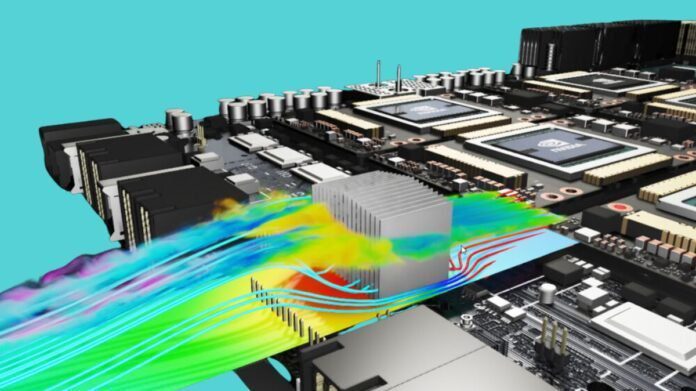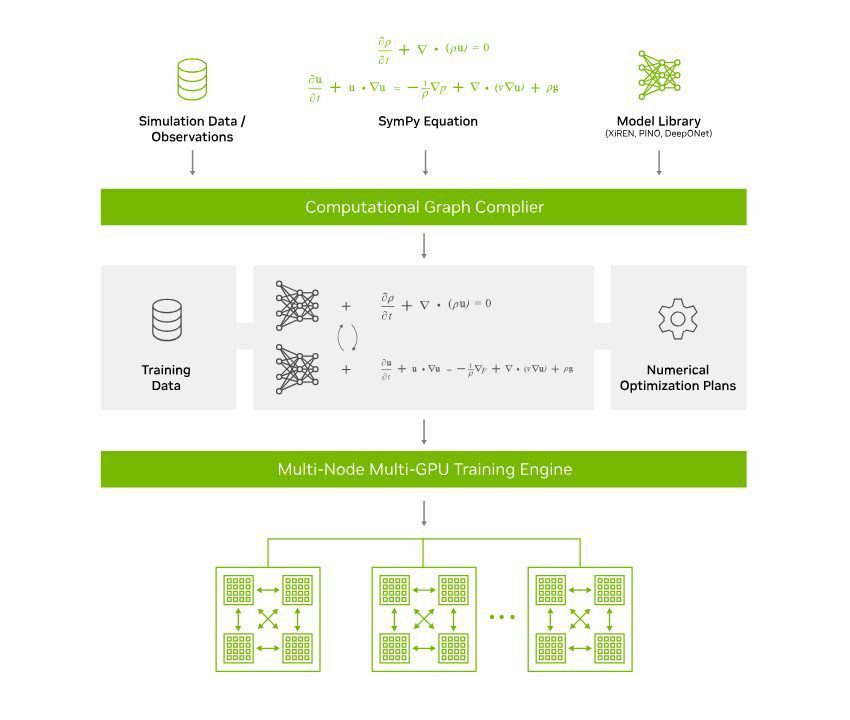NVIDIA Modulus
Using a straightforward Python interface, NVIDIA Modulus is an open-source platform for creating, refining, and training Physics-ML models.
With the help of Modulus, engineers can create AI surrogate models that integrate simulation, observed data, and physics-driven causality to make predictions in real time. You can improve engineering simulations and provide higher-fidelity data for scalable, responsive solutions by utilizing generative AI with diffusion models. Large-scale digital twin models can be created using Modulus in a variety of physics fields, including electromagnetics, structural mechanics, and computational fluid dynamics.
Enhance your engineering simulations with AI by using NVIDIA Modulus. You can create models for enterprise-scale digital twin applications in a variety of physics fields, including electromagnetics, structural physics, and CFD.
Physics-Informed Machine Learning for Surrogate Models
What is NVIDIA Modulus?
An open-source platform called NVIDIA Modulus enables users to create, train, and optimize physics-machine learning (Physics-ML) models:
- What it does: Uses AI models and physics-based simulations to address practical science and engineering issues.
- It is intended for developers, researchers, scientists, and companies.
- What it can do: Assist in resolving issues with climate modeling, materials science, and fluid dynamics.
- How it operates: Deep learning models are constructed using training data, boundary conditions, and physics.
- Features include PDE-driven AI methods, an end-to-end pipeline, and innovative model designs.
NVIDIA Modulus is available under the Apache 2.0 license and is based on PyTorch. It is accessible through the end-to-end AI software platform NVIDIA AI Enterprise.
Benefits
An open-source, freely accessible AI framework called Modulus is used to create innovative AI architectures for engineering systems as well as physics-ML models.
AI Physics Toolkit
Use straightforward Python APIs to quickly configure, create, and train AI models for physical systems in any field, from life sciences to engineering simulations.
Personalize Models
Advanced pretrained models from the NVIDIA NGC library can be downloaded, expanded upon, and customized.
Near-Real-Time Deduction
Use AI surrogate models to simulate in almost real time by creating digital twins of your physical systems.
Utilize NVIDIA AI to Scale
Scale training performance from a single GPU to multi-node implementations by utilizing NVIDIA AI.
Design Open-Source
Discover the advantages of open source. Modulus is available under the Apache 2.0 license and is based on PyTorch.
Uniform
Work with physics-ML models using the best AI development standards, with an immediate emphasis on engineering applications.
Easy to Use
Increase productivity using Pythonic API interfaces that are simple to program and error messages that are straightforward to understand.
Superior Quality
Make use of top-notch software with enterprise-level development, comprehensive validation and documentation, and tutorials for beginners.
Important Features
New Model Architectures
From solely physics-driven models like PINNs to physics-based, data-driven architectures like neural operators, GNNs, and generative AI-based diffusion models, Modulus provides a range of methods for training physics-based models.
Modulus contains diffusion models trained on NVIDIA DGX across open-source, free datasets found in the documentation, as well as curated Physics-ML model architectures, Fourier feature networks, Fourier neural operators, and GNNs.
Training State-of-the-Art Physics-ML Models
From importing geometry to adding PDEs and extending the training to multi-node GPUs, Modulus offers an end-to-end pipeline for training Physics-ML models. Additionally, Modulus offers reference applications that serve as training recipes.
Explicit Parameterization
In order to train the surrogate model with a range of values to learn for the design space and to infer several situations at once, Modulus offers explicit parameter descriptions.
How to Begin Using NVIDIA Modulus
Download Containers and Models for Development
Create Physics-ML models with NVIDIA NGC’s free Modulus container and pretrained models.
Large-Scale Processes
Experience the simplicity of scaling to enterprise workloads by gaining free access to NVIDIA cloud workflows for Modulus.
Self-Study Online Program
Explore physics-informed machine learning with Modulus in a practical introduction course offered by the NVIDIA Deep Learning Institute (DLI).
Omniverse Integration
The outputs of a model trained using Modulus can now be seen with an extension that connects and builds bespoke 3D pipelines with the NVIDIA Omniverse platform. You can import the output results for typical output scenarios, including streamlines and iso-surfaces, into a visualization pipeline using the Modulus extension. Additionally, it offers an interface that makes it possible to interactively explore design parameters and variables in order to infer new system behavior and visualize it almost instantly.
Production-Ready Solution With NVIDIA AI Enterprise
With NVIDIA AI Enterprise, an end-to-end AI software platform designed to propel businesses to the forefront of AI, Modulus is now accessible. NVIDIA AI Enterprise provides enterprise-grade support, security, and API stability while reducing the possible risks associated with open-source software. It also offers access to AI solution workflows to expedite time to production, validation and integration for NVIDIA AI open-source software, and certifications to deploy AI globally.


